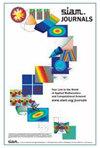使用多输出、多统计估计器进行多保真度采样的协方差表达式:近似控制变量的应用
IF 1.9
3区 工程技术
Q2 MATHEMATICS, INTERDISCIPLINARY APPLICATIONS
引用次数: 0
摘要
SIAM/ASA 不确定性量化期刊》第 12 卷第 3 期第 1005-1049 页,2024 年 9 月。 摘要.我们提供了一系列基于蒙特卡罗的多输出均值、方差和来自模型集合的 Sobol 主效应方差估计器之间的协方差表达式的结果。这些协方差可用于多保真度不确定性量化策略中,该策略旨在利用低保真度模型集合降低高保真度蒙特卡罗估计器的估计方差。近似控制变量和多层次最佳线性无偏估计器等方法都需要这种协方差表达式。虽然文献为一些单一输出情况(如均值和方差)提供了这些表达式,但我们的结果与任何采样策略下的多个函数输出和多个统计量都相关。在对这些结果进行描述后,我们在近似控制变量方案中使用这些结果表明,与单输出方法相比,利用多输出可以显著降低估计方差。我们使用合成示例来突出优化样本分配和试点样本估计的效果。此外,还使用了进入、下降和着陆的飞行轨迹模拟来演示实际应用中的多输出估计。本文章由计算机程序翻译,如有差异,请以英文原文为准。
Covariance Expressions for Multifidelity Sampling with Multioutput, Multistatistic Estimators: Application to Approximate Control Variates
SIAM/ASA Journal on Uncertainty Quantification, Volume 12, Issue 3, Page 1005-1049, September 2024.
Abstract.We provide a collection of results on covariance expressions between Monte Carlo–based multioutput mean, variance, and Sobol main effect variance estimators from an ensemble of models. These covariances can be used within multifidelity uncertainty quantification strategies that seek to reduce the estimator variance of high-fidelity Monte Carlo estimators with an ensemble of low-fidelity models. Such covariance expressions are required within approaches such as the approximate control variate and multilevel best linear unbiased estimator. While the literature provides these expressions for some single-output cases such as mean and variance, our results are relevant to both multiple function outputs and multiple statistics across any sampling strategy. Following the description of these results, we use them within an approximate control variate scheme to show that leveraging multiple outputs can dramatically reduce estimator variance compared to single-output approaches. Synthetic examples are used to highlight the effects of optimal sample allocation and pilot sample estimation. A flight-trajectory simulation of entry, descent, and landing is used to demonstrate multioutput estimation in practical applications.
Abstract.We provide a collection of results on covariance expressions between Monte Carlo–based multioutput mean, variance, and Sobol main effect variance estimators from an ensemble of models. These covariances can be used within multifidelity uncertainty quantification strategies that seek to reduce the estimator variance of high-fidelity Monte Carlo estimators with an ensemble of low-fidelity models. Such covariance expressions are required within approaches such as the approximate control variate and multilevel best linear unbiased estimator. While the literature provides these expressions for some single-output cases such as mean and variance, our results are relevant to both multiple function outputs and multiple statistics across any sampling strategy. Following the description of these results, we use them within an approximate control variate scheme to show that leveraging multiple outputs can dramatically reduce estimator variance compared to single-output approaches. Synthetic examples are used to highlight the effects of optimal sample allocation and pilot sample estimation. A flight-trajectory simulation of entry, descent, and landing is used to demonstrate multioutput estimation in practical applications.
求助全文
通过发布文献求助,成功后即可免费获取论文全文。
去求助
来源期刊

Siam-Asa Journal on Uncertainty Quantification
Mathematics-Statistics and Probability
CiteScore
3.70
自引率
0.00%
发文量
51
期刊介绍:
SIAM/ASA Journal on Uncertainty Quantification (JUQ) publishes research articles presenting significant mathematical, statistical, algorithmic, and application advances in uncertainty quantification, defined as the interface of complex modeling of processes and data, especially characterizations of the uncertainties inherent in the use of such models. The journal also focuses on related fields such as sensitivity analysis, model validation, model calibration, data assimilation, and code verification. The journal also solicits papers describing new ideas that could lead to significant progress in methodology for uncertainty quantification as well as review articles on particular aspects. The journal is dedicated to nurturing synergistic interactions between the mathematical, statistical, computational, and applications communities involved in uncertainty quantification and related areas. JUQ is jointly offered by SIAM and the American Statistical Association.
 求助内容:
求助内容: 应助结果提醒方式:
应助结果提醒方式:


